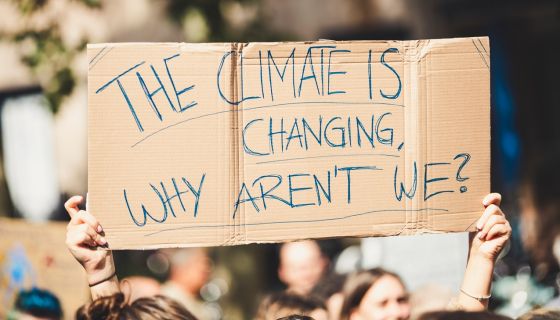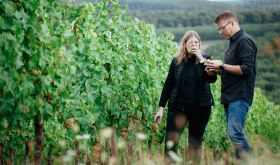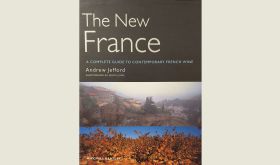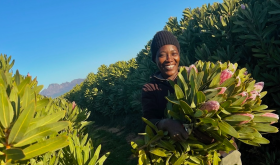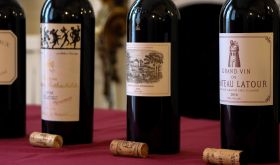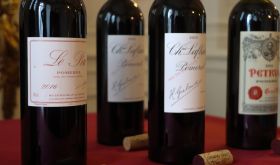22 September 2020 Details of the 18 shortlisted entries are published here.
13 August 2020 See this guide to the entries so far published.
1 July 2020 Announcing our annual summer writing competition … entries very welcome throughout July and the first half of August.
Back in what now seems like another world and another age, but in fact was just January this year, we announced the winners of our 20th-anniversary competition.
One of them was Steve Connolly of Liverpool, who wrote, ‘I think that climate change should figure in the celebrations as this is such a huge issue for the whole world. Vineyards are a harbinger of this change, and wine production and transport are contributors to the problem. While I think we are beyond the need for raising awareness of climate change, I think we are at the beginning of the wine industry adopting radical action for change.’
His suggestion was that we hold a tasting of 20 carbon-neutral or carbon-negative wines and, pre pandemic, we had been hoping to celebrate in London on Sunday 1 November. This event, like so much else is, alas, uncertain in these uncertain times.
Whether we can all get together or not, we have decided to take things further than matters carbonic, and are combining anniversary considerations with this year's writing competition.
‘Sustainability’ is, perhaps, an overused word, but it’s still one of the best words out there to define the way human beings have to think and operate if this planet is going to survive.
Sustainability has several strands, all deeply interconnected, feeding into the three biggest, life-threatening issues we are facing today: the climate crisis, the biodiversity crisis and the social-justice crisis.
Recently, leaders from the the United Nations, the World Health Organisation and WWF International issued a chilling message about the pandemic: ‘Our destructive behaviour towards nature is endangering our own health – a stark reality we’ve been collectively ignoring for decades’, they wrote, describing our ‘broken relationship with nature’ (The Guardian, 17 June 2020). So if we’re convincing ourselves that COVID-19 is a separate issue from sustainability, we’re doing it at our own peril.
The International Energy Agency recently published their Sustainable Recovery Plan aimed at world leaders, with Dr Fatih Birol, executive director, saying that ‘governments have a once-in-a-lifetime opportunity to reboot their economies and bring a wave of new employment opportunities while accelerating the shift to a more resilient and cleaner energy future’.
The wine industry, too, has a once-in-a-lifetime opportunity to use the COVID-19 crisis to bring about radical change in all three of those areas.
In the meantime, there are heroes out there who have long been pioneering sustainability, and our wine writing competition this year is aimed not only at celebrating them but also at putting a spotlight on their stories to point the way for others to follow suit.
We want you to tell us about the producer that you believe is a sustainability hero and why. You might want to tell us about more than one.
We’re looking for producers who go a little further than avoiding herbicides. We’re looking for producers who put sustainability at the heart of everything they do. These are just some of the aspects of sustainability that we’ll be considering:
- People: employee safety, health, training and equal opportunity; fair wages, fair treatment; local community support and involvement; charitable projects; financial sustainability (a business has to plan to survive in order to do good!)
- Carbon footprint:
- Heating, cooling, power: efficiency of buildings and equipment, fuel sources, electricity, lighting, machinery
- Transport: vehicles and their use, transportation of grapes and wine, commuting/travel (thinking of all those flying winemakers…)
- Packaging: glass weight, labels, closures, shipping materials
- Chemical inputs (carbon footprint of their production)
- Low-carbon technologies
- Recycling
- Biodiversity: chemical inputs (fertilisers, pesticides, herbicides, fungicides), microbial health of the soil, increasing or preserving natural habitat, tree planting, protection/encouragement of wildlife and ecosystems
- Soil: conservation and health, tillage, compaction, erosion, enrichment
- Water: conservation, management, rainwater harvesting, winery usage and waste
- Waste: winery and vineyard, other non-biodegradable waste, bio-waste from vineyard and winery, use of plastic in the office
- Certifications: any and all, from carbon neutral to organic and biodynamic
We’re especially interested in producers who consider the full life cycle of their wine, from raw materials (where do those plastic vine ties come from and did they ship their Carrara marble tasting-room floor from Italy to California?) to how much energy it takes to recycle the empty wine bottle once the consumer has finished it.
We welcome as many relevant facts and figures as you can provide.
Here are the rules.
- An ideal length for the article would be 1,000 words, and certainly between 500 and 2,000 words.
- We’re looking for thoughtful and/or entertaining, well-written text, a story rather than a bullet-point list of criteria fulfilled.
- You may choose a producer from anywhere in the world, big or small.
- You may nominate as many producers as you like, but each producer should be presented as a separate entry.
- Don’t embellish the facts and figures – we will be grilling the producers selected!
- Your article shouldn’t have been published elsewhere.
- You may be based anywhere, may be any age, may be a wine professional or amateur, but we would like you to send us, at the top of the Word document, a brief description of yourself including your employment (if at all) and location.
- Please include at least one suitable, copyright-free image to illustrate it. It needs to be landscape shaped (ie wider than it is tall) and at least 1,275 pixels wide and 725 pixels high. We are happy to credit the photographer if necessary.
- Please send your article in a single Word document (NOT PDFs or any other format) attached to the email rather than embedded in the email, with Writing competition and the name of the producer in the subject line.
- Please also indicate any relationship you may have with the producer nominated or any commercial interest.
- Send your entry to editorial@jancisrobinson.com.
The deadline is 15 August 2020, although please send in your entry as early as possible so that we can start publishing the best of them soon. (Experience suggests that the early-submitted entries stand the greatest chance of being published.)
What we will do:
- We undertake to read all contributions and would like to publish the best, with due credit.
- Advised by independent specialist experts, the JancisRobinson.com team will decide on the winner of the competition, who will win a copy of Wine Grapes (£120 Penguin) to encourage biodiversity, the 8th edition of The World Atlas of Wine (£50 Mitchell Beazley) for all of its coverage of climate change, and the 4th edition of The Oxford Companion to Wine (£40 OUP) for its almost 4,000 entries including one on sustainability and much else besides. Each of these books has won multiple awards and is recognised as a prime wine reference. Plus, two years' membership of our Purple Pages so you can keep up with developments.
If you'd like to see details of our writing competitions in previous years, take a look at these reports on them in 2019, 2018 and 2017.

